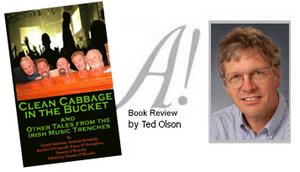

Clean Cabbage in the Bucket and Other Tales from the Irish Music Trenches by Frank Emerson, Seamus Kennedy, Robbie O'Connell, Harry O'Donoghue, and Dennis O'Rourke. Edited by Dennis O'Rourke. Coral Springs, FL: Llumina Press, 2007.
The ongoing popularity of Irish music has much to do with its blend of infectious melodies, spirited rhythms, and sometimes sad, often funny, but always moving lyrics. But that music's enduring appeal is also a result of the individual and collective charm of its performers.
Clean Cabbage in the Bucket and Other Tales from the Irish Music Trenches - a new anthology of short writings by five Irish musicians who for many years have plied their trade in various venues across the U.S. - is chock-full of charm. While it provides the reader with a sense of the song repertoire and instrumental technique associated with Irish music, the book's focus is on the professional and personal lives of Irish musicians, who possess the uncanny ability to captivate an audience by drawing upon inspired musicianship, loquacious - if often bawdy - storytelling, and a ferocious sense of humor.
Musicians have long told stories that convey their experiences within their romanticized if misunderstood profession, but such stories are generally shared with fellow musicians, not with the public. Clean Cabbage in the Bucket is unique in that it documents the types of stories that musicians often tell but rarely write down. The five performers who committed their experiences to paper have obviously spent hours swapping stories with each other. Hence, though the pieces in the book were written separately, Clean Cabbage in the Bucket reads as though it contains transcriptions of orally swapped stories from an impromptu, post-performance round-robin between musicians sitting in a pub, collectively reflecting about their careers over pints of Guinness.
Clean Cabbage in the Bucket was edited by one of the aforementioned musicians, Dennis O'Rourke. Ironically the only one among the five not born in Ireland, the Massachusetts-native O'Rourke is not only a performer of Irish songs but also a successful country music songwriter best known for having composed "Honky Tonk Moon," a number one hit in 1988 for Randy Travis. Showing considerable imagination in his editing, O'Rourke juxtaposed writings by all five musicians so as to constantly shift the focus of from the sublime to the silly and back again; the overall effect is that of going on a wild ride. Some people may choose to read the book in the traditional manner, and those who read the book from the beginning to the end will be amply rewarded (similar-themed selections are grouped together into separate chapters identified by colorful titles like "There Are Risks, But It's Better Than Playing In The Piranha Pool...Sort Of"). Other people may enjoy by opening the book randomly and by reading just a few of the more than 80 different selections incorporated in the book.
Among the many noteworthy individual pieces in Clean Cabbage in the Bucket are three that illustrate the book's broad range of material: a memoir by Seamus Kennedy, in which the musician recalls publicly performing his parody of the 1971 hit song "Country Roads" with John Denver himself in the audience; a piece by Frank Emerson, in which he reflects upon his bout with cancer and its impact on his music career; and an evocative narrative that reads like a tightly crafted short story: O'Rourke's memoir entitled "Tinted Windows."
Significantly, a reader doesn't need to be especially fond of Irish music in order to enjoy this book's generous sampling of humorous anecdotes, philosophical reflections, and outrageous jokes. While not as widely known as their fellow Irishmen the Clancy Brothers, Paul Brady, or Christy Moore, the five Irish musicians who contributed their stories to Clean Cabbage in the Bucket are master entertainers who possess a rare combination of musical ability, the gift of gab, and street smarts. Indeed, as this book memorably illustrates, all five are as tough as they are talented, having surmounted the archetypal difficulties of being traveling troubadours, and all ultimately flourished in their roles as unofficial diplomats of Irish culture in America.
About the reviewer: Ted Olson is former director of Appalachian-Scottish and Irish Studies at the Center for Appalachian Studies and Services at East Tennessee State University. Olson's poems, creative nonfiction, essays, and photographs have appeared in a wide variety of magazines. For many years, he has performed traditional and contemporary American, British, and Irish songs and ballads at educational and entertainment venues.